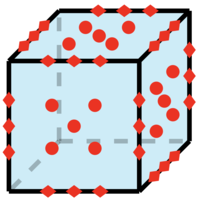Bringing Trimmed Serendipity Methods to Computational Practice in Firedrake

|
We present an implementation of the trimmed serendipity finite element family, using the open source finite element package Firedrake. The new elements can be used seamlessly within the software suite for problems requiring H1, hcurl, or hdiv-conforming elements on meshes of squares or cubes. To test how well trimmed serendipity elements perform in comparison to traditional tensor product elements, we perform a sequence of numerical experiments including the primal Poisson, mixed Poisson, and Maxwell cavity eigenvalue problems. Overall, we find that the trimmed serendipity elements converge, as expected, at the same rate as the respective tensor product elements while being able to offer significant savings in the time or memory required to solve certain problems. |
[Source Code on Zenodo]
[DOI/EE link]
[Preprint on arXiv.org]
@article{CCHMKLG22,
author = {Justin Crum and Cyrus Cheng and David A. Ham and Lawrence Mitchell and Robert C. Kirby and Joshua A. Levine and Andrew Gillette},
ee = {https://dx.doi.org/10.1145/3490485},
journal = {{ACM} Trans. Math. Softw.},
month = {2},
number = {1},
pages = {8:1--8:19},
title = {Bringing Trimmed Serendipity Methods to Computational Practice in Firedrake},
volume = {48},
year = {2022}
}